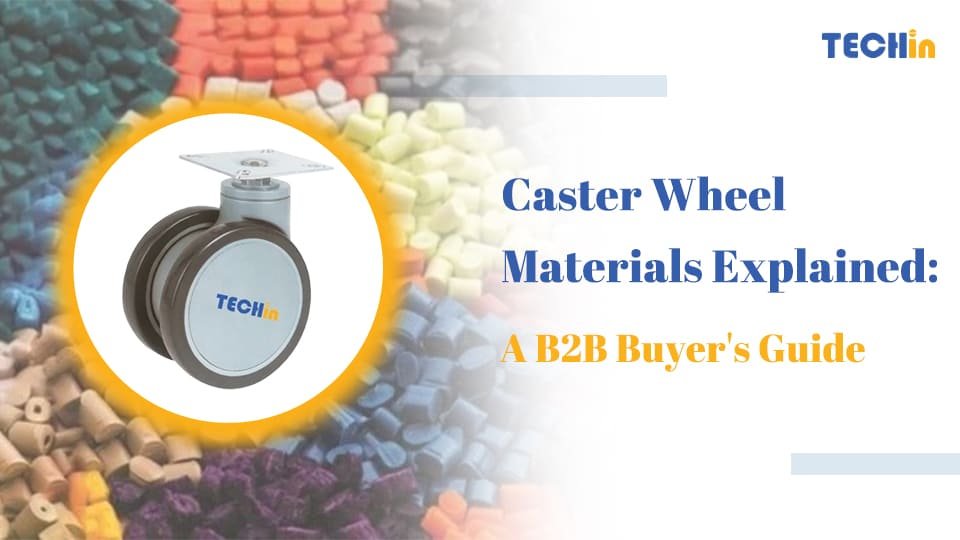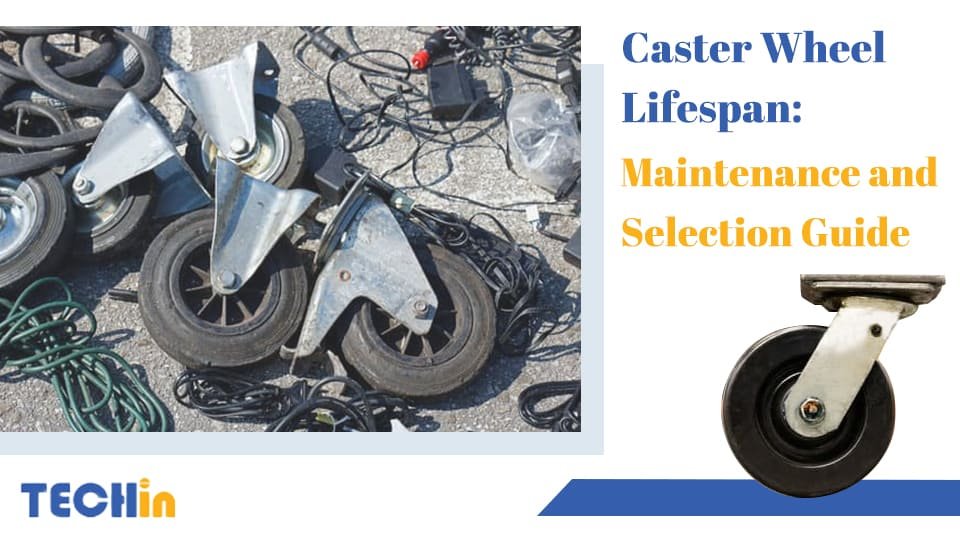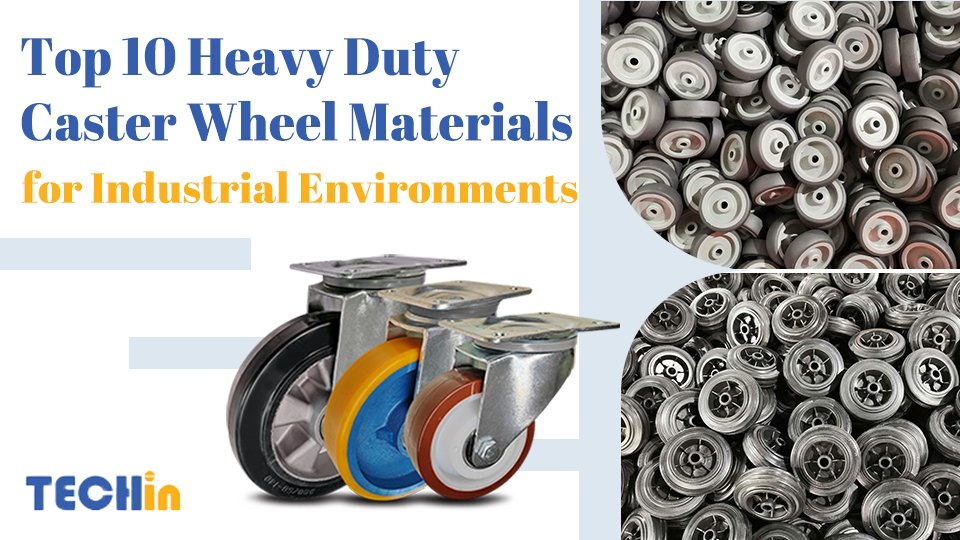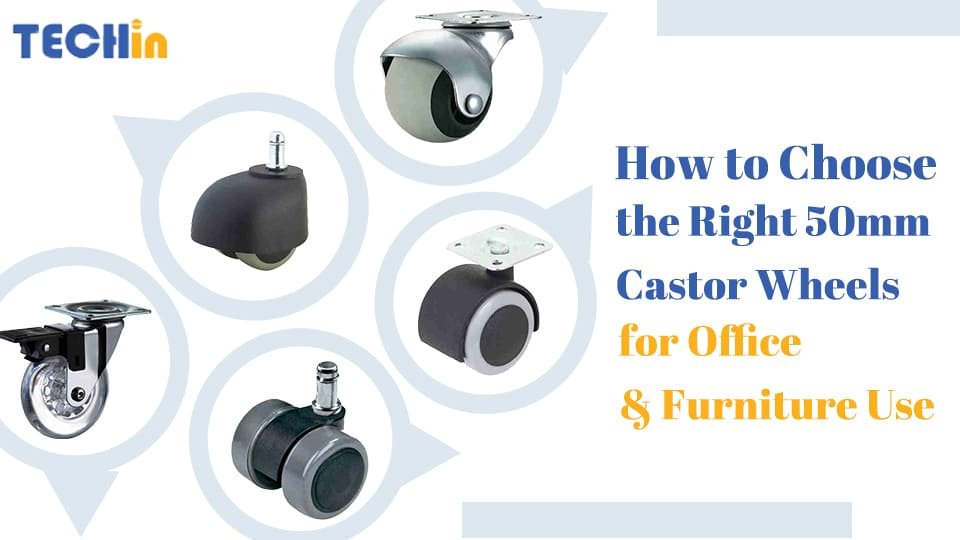When you’re choosing caster wheels, especially for industrial or heavy-duty use, the material you choose makes a big difference in how well they perform and how long they last. Polyurethane is one of the most versatile and dependable materials for caster wheels because it’s strong, flexible, and resilient. But what is polyurethane, and why is it used so often in caster wheels?
Polyurethane caster wheels are made from two types of polyurethane: Thermoplastic Polyurethane (TPU) and Thermoset Polyurethane (PUR). Both types are created by mixing isocyanates and polyols to form a tough elastomer. This material can be adjusted to different levels of hardness and flexibility, which makes it useful for a wide variety of applications.
The Chemistry Behind Polyurethane Casters
All polyurethanes have the same basic chemical makeup: they’re made by combining a polyol (a type of alcohol) with an isocyanate. This reaction creates a polymer that can be adjusted to different hardness levels, which makes it useful for lots of different things.
There are two main types of polyols used in polyurethane manufacturing:
- Polyether Polyol: Known for better water resistance and flexibility.
- Polyester Polyol: Provides enhanced chemical resistance and mechanical strength.
These differences in polyols contribute to the diverse properties of polyurethane, making it adaptable to various applications. For caster wheels, these properties translate into superior load-bearing capabilities, wear resistance, and longevity.
What Are the Advantages of Polyurethane Casters?
Polyurethane caster wheels are gaining popularity across various industries due to their numerous benefits:
- Durability: Polyurethane is incredibly resistant to abrasion, cuts, and tears, ensuring a long lifespan even under heavy use. This durability makes polyurethane casters ideal for industrial applications where equipment is frequently moved.
- High Load Capacity: Polyurethane wheels can support heavier loads than rubber or plastic wheels. This high load capacity is essential in manufacturing and warehousing environments where equipment needs to move heavy materials.
- Noise Reduction: Polyurethane’s softer composition compared to metal or nylon reduces noise levels during operation. This is especially beneficial in environments like hospitals, offices, or retail spaces where noise reduction is a priority.
- Floor Protection: Polyurethane wheels are non-marking and gentle on floors, unlike harder materials like steel or nylon. This protects surfaces from scratches and scuffs, extending the life of flooring in both industrial and commercial settings.
- Chemical and Water Resistance: Polyurethane’s resistance to oils, solvents, and water allows it to perform well in harsh environments, including those with frequent exposure to chemicals or moisture.
- Traction and Grip: Polyurethane provides superior traction, making it ideal for use on slippery or uneven surfaces. This is particularly useful in environments like kitchens, bathrooms, or outdoor settings where safety is a concern.
Common Manufacturing Techniques for Polyurethane Casters
Polyurethane caster wheels can be manufactured using several methods, each offering different benefits:
- Open Molding: This technique involves mixing the two-part polyurethane material and pouring it into molds. The material sets quickly, making this method efficient but requiring careful timing to avoid waste.
- Machine Casting: Similar to open molding but automated, machine casting ensures consistent quality and reduces human error.
- Injection Molding: Primarily used for TPU, this process involves melting polyurethane pellets and injecting them into molds. It’s ideal for mass production and allows for the creation of complex shapes.
- Spraying and Coating: Polyurethane can also be sprayed onto surfaces to create a protective coating, enhancing the properties of the base material.
- Machining: Polyurethane can be machined into precise shapes using traditional techniques like milling or grinding. This method is often used for harder grades of polyurethane.
Applications of Polyurethane Caster Wheels
Polyurethane caster wheels are versatile and used in a wide array of applications:
- Industrial Settings: They are ideal for heavy machinery, carts, and equipment that require durable, load-bearing wheels.
- Healthcare Facilities: The quiet operation and non-marking properties make them perfect for hospitals and laboratories.
- Retail and Office Environments: Polyurethane wheels protect flooring while providing smooth, noiseless movement.
- Outdoor Applications: Resistant to UV rays and harsh weather, polyurethane wheels are suitable for outdoor use in various conditions.
How Do Polyurethane Wheels Compare to Other Materials?
When comparing polyurethane to other materials used in caster wheels, it often outperforms in several key areas:
- Rubber: While rubber is softer, polyurethane offers better durability and load capacity, making it more suitable for heavy-duty applications.
- Nylon: Polyurethane provides better floor protection and quieter operation than nylon, which can be noisy and damaging to floors.
- Polyolefin: Although polyolefin is more economical, it lacks the durability and load-bearing capabilities of polyurethane, making it less ideal for demanding applications.
People Also Ask
1. What are polyurethane caster wheels?
Polyurethane caster wheels are made from a synthetic material that combines the flexibility of rubber with the durability of plastic. This combination allows these wheels to absorb shocks and protect floors while also handling heavy loads. They are commonly used in industrial, healthcare, and retail settings due to their non-marking, durable nature. Polyurethane’s versatility means it can be tailored to different levels of hardness, making it suitable for a variety of applications. Whether on hospital beds or heavy-duty carts, polyurethane wheels provide a balance of performance and protection.
2. Why are polyurethane wheels preferred over rubber?
Polyurethane caster wheels are made from a synthetic material that combines the flexibility of rubber with the durability of plastic. This combination allows these wheels to absorb shocks and protect floors while also handling heavy loads. They are commonly used in industrial, healthcare, and retail settings due to their non-marking, durable nature. Polyurethane’s versatility means it can be tailored to different levels of hardness, making it suitable for a variety of applications. Whether on hospital beds or heavy-duty carts, polyurethane wheels provide a balance of performance and protection.
3. How are polyurethane caster wheels made?
Polyurethane caster wheels are made using different processes depending on the type of polyurethane. Thermoplastic Polyurethane (TPU) is typically injection-molded, where melted pellets are formed into wheels. This process is efficient and allows for consistent quality. Thermoset Polyurethane (PUR) is created through casting, where liquid polyurethane is poured into molds and cured into a solid form. This process results in highly durable wheels that are ideal for heavy-duty applications where long-term performance is crucial.
4. Are polyurethane wheels good for outdoor use?
Yes, polyurethane wheels are well-suited for outdoor use because they are resistant to water, UV radiation, and extreme temperatures. These properties ensure that the wheels won’t degrade when exposed to the elements, making them reliable in various outdoor conditions. Their durability also means they can handle rough surfaces and uneven terrain, providing a smooth and consistent performance even in challenging outdoor environments.
5. What types of equipment are suitable for polyurethane caster wheels?
Polyurethane caster wheels are versatile and can be used on a wide range of equipment. In industrial settings, they are commonly found on carts and trolleys that need to move heavy loads smoothly. Their durability makes them ideal for such demanding tasks. In healthcare and retail environments, polyurethane wheels are valued for their quiet operation and non-marking properties, making them suitable for equipment like hospital beds, medical carts, and shopping carts.
6. How to Maintain Polyurethane Caster Wheels?
To keep polyurethane caster wheels in good condition, regular cleaning is essential. Remove dirt and debris to prevent wear and tear. Additionally, inspect the wheels for any signs of damage, such as cracks or flattening, and replace them if necessary to avoid more significant problems.
Proper lubrication of the wheel bearings is also crucial to reduce friction and ensure smooth rolling. By following these maintenance steps, you can extend the lifespan of your polyurethane wheels and ensure they continue to perform reliably.
In Summary
Polyurethane caster wheels offer a durable, versatile solution for various applications. By understanding their benefits and maintaining them properly, you can ensure these wheels provide reliable performance across different environments.
If you need high-quality polyurethane caster wheels for your industrial or commercial needs, we can help! Get in touch with us today to talk about what you need and find the perfect solution for your application.
Tel/WhatsApp: +86 13417057114
Email: info@techincastor.com










